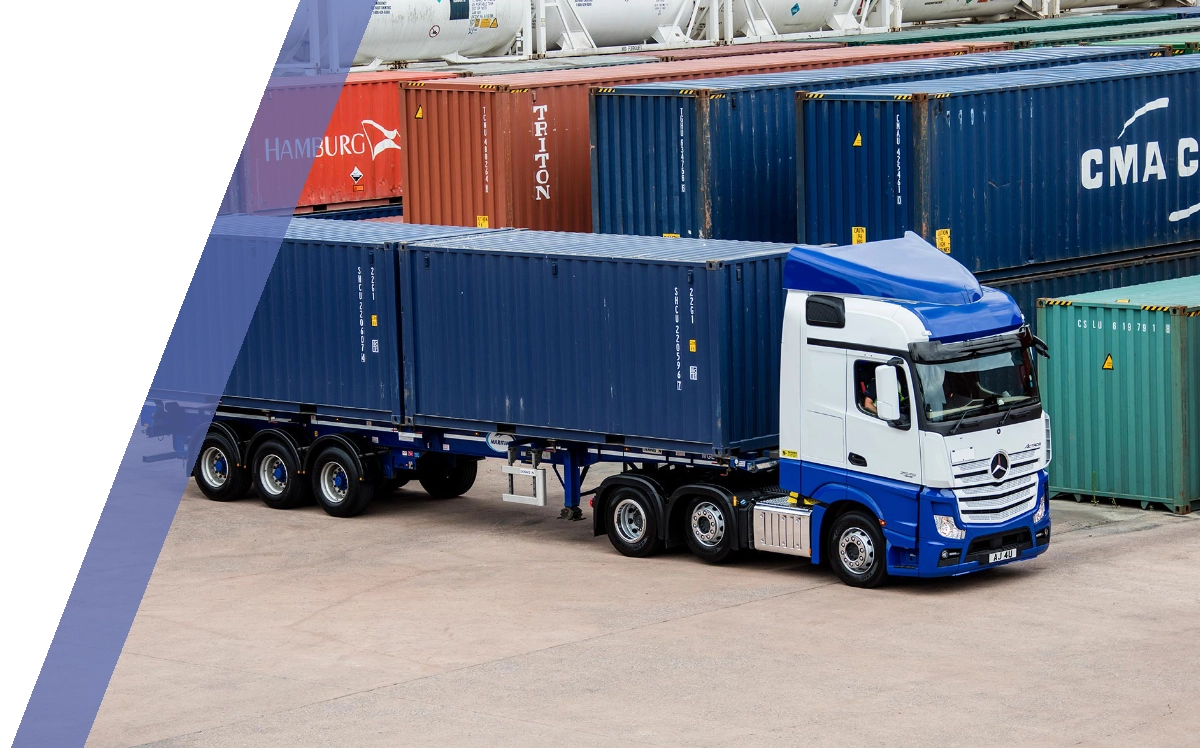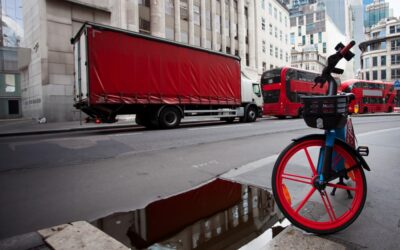Goods in Transit Insurance
Protecting your goods while they are in transit, whether that’s by road, rail, sea or air

At Anthony Jones we understand the importance of transporting goods from A to B safely and securely. This is true not just for businesses directly working within the Transport and Logistics sector, but also for all businesses manufacturing and selling products. Many businesses rely on parts arriving safely for the smooth running of their production lines and also for the safe despatch of finished goods.
Goods that are lost, stolen or damaged in transit can impact a business’s profitability and even their long-term viability.
Who Needs Goods in Transit Insurance?
If your business relies on moving goods from one location to another, whether that’s shipping in parts you need for products you manufacture or sell, or transporting finished goods to customers, you’ll need Goods in Transit (or GIT) insurance.
It’s your responsibility to ensure goods arrive at their destination in one piece and, if they are lost, stolen or damaged while they are being transported, you will be liable for the cost. Goods in Transit insurance will provide you with the financial protection and peace of mind if something happens to your goods while they are on the move.
Additional Cover for Business and Commercial Vehicles
Goods in Transit insurance covers your liability for goods or products that are lost, damaged (either maliciously or accidentally) or stolen while they are being transported or stored immediately beforehand. Damage could be caused by:
- Loading or unloading
- Weather
- Piracy
- Infestation
- Theft
- Or other factors resulting in damage
Insurance can cover goods in transit in the UK, Europe or Worldwide.
As a result of General Average, if you don’t have Goods in Transit insurance, you could find yourself liable for the damage or loss of goods that don’t belong to you. Even if your goods survive transportation, you could be liable to recompense others who lost their goods when they were abandoned to protect the transport vessel.
Why Anthony Jones?
Anthony Jones have been in the business of insuring Goods in Transit since we were established back in 1984. That means we have a wealth of experience in the Transport and cargo sector. We pride ourselves on both our specialist knowledge and the strong relationships we’ve formed with insurers over this time, which gives us considerable weight and leverage in the market.
We believe we go the extra mile for our customers and their feedback is testament to this.
Need more
information?

Please call John Donaghy or the team on 020 8290 9099 to see how we can help you with your mixed commercial motor fleet insurance. Alternatively, you can email us at cm@anthonyjones.com
“I have worked with Steve and his team @ Anthony Jones over the last 15 years.
They have always provided a very professional/honest first class brokering service, giving confidence that we are getting the best price/service.
I would recommend without question.”
Aaron Pilcher
Director
Infinity Container Logistics

FAQ’s
Some of our most asked questions, answered below:
When would I need Commercial Vehicle insurance rather than Car insurance?
If you have a company and have vehicles that you use within the business, then you need Commercial Vehicle insurance. The vehicles you own might include those which are obviously commercial vehicles, such as lorries, vans and forklift trucks. But company cars are also classed as commercial vehicles and should be covered by Commercial Vehicle insurance. Private car insurance will not include cover for company-owned cars.
When would I need Fleet insurance rather than Multi-Car insurance?
Multi-Car insurance can be used to cover a number of privately-owned cars used for personal use, perhaps incorporating a bit of business use, such as commuting, too. However, Multi-Car insurance can’t be used to cover company cars. For this, you’ll need Fleet insurance. If you want to insure fewer than 5 or 6 company cars or other commercial vehicles, you can protect them with a Mini-Fleet insurance policy.
What is Goods in Transit insurance?
Goods in Transit insurance (GIT insurance for short) is also often referred to as Cargo insurance. As the name suggests, this insurance covers goods (which includes everything from food to furniture, building supplies to cars, and machinery parts to animals) which are being transported from one place to another. Goods in Transit insurance protects your goods in case they are damaged or lost while they are being transported by road, air, rail or sea.
HGV Medical: What is Involved & When Is It Due?
At Anthony Jones we have created an online resource to answer your questions at your convenience. Simply browse a category to find FAQs relating to that section.
Reviews

Straightforward, thankyou
Stephen Passfield is our account handler is one of the best agent we've worked with.
He is very helpful,kind and flexible to us and always there for us.
We've couldn't asked for more.
Thank you much for help for whole these years.
We really appreciate and very grateful to you.
We highly recommend him and his team
TM Brothers Transport
Their agents always very kind, flexible and helpful.
I highly recommend them.
"I chair a campaign to save our local pub. We launched a share sale and succeeded in buying the Crown a few days ago, so we needed help in selecting the right insurance for the site whilst renovations were under way, including unoccupied property cover. Tony Ellis of Anthony Jones Insurance was really helpful in guiding us through this process, and we now have the correct cover in place. Fast, easy to deal with & knowledgeable - just what you need from your insurance broker! Well done Tony and all at A Jones."
News
Tyre Tread Depth Best Practice Policy For Fleets
In this post we’ll explore how to design an effective tyre tread depth best practice policy for your fleet. We’ll also look at some recent calls to increase the legal minimum tyre tread depth in the UK. As a fleet operator, you have a legal obligation to ensure that...
What Does Truck Breakdown Cover Include?
Truck breakdown insurance can cover the expenses you may occur should your HGV break down. In this post we’ll outline what truck breakdown insurance covers, along with some of the limits to the cover. At Anthony Jones, we can provide a level of breakdown cover as part...
London Lorry Control Scheme (LLCS) Amendments & Crackdown
The London Lorry Control Scheme (LLCS) prohibits HGVs over 18 tonnes from using residential roads at certain times. In this post we’ll look at some recent amendments London Councils made to the scheme, along with the penalties you may face for not abiding by the...
Should You Let Drivers Use Company Vans for Personal Use?
There are a number of benefits to letting drivers use company vans for personal journeys. But then, doing so can create additional costs, risks, and admin tasks for fleet managers. So in this post we’ll discuss the pros and cons of letting drivers use company vans for...




